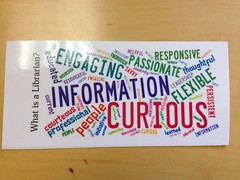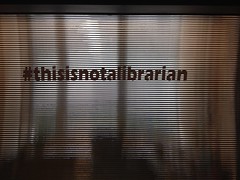 Every year, summer goes by too quickly.
Every year, summer goes by too quickly. Even now, my memories of the end of the spring semester are still fresh, even though it ended in mid-May. Summer doesn't feel as if it has arrived until the
Special Libraries Association Annual Conference, which normally occurs in mid-June (
blog posts). After that, the days move quickly, helped by days in July when I teach or interact with new MLIS students. Now it is August 4 and the fall semester begins in 21 days.
The new
Syracuse University MLIS students, who will be taking their classes online, began their program with a seven day bootcamp in July. Their one class ended in a poster session and this year's topic was about what a librarian is. Some teams focused on specific types of libraries or librarians, and all of the
posters sparked lively conversations. On the right is one of the handouts, which is actually a bookmark.
 |
| Vinyl sticker with the one group's hashtag. |
|
One team took on the task of discussing what jobs or tasks a librarian does not do. Prior to the poster session, the team took to Twitter and other online outlets to gather information from practitioners. They frequently heard from one person, who said that a librarian doesn't do "X", and then hear from someone else who would gave an an example of a librarian doing just that! Librarians indeed do many different things that break the mold. If you are interested in the topic, you might ask your colleagues what they think librarians don't do, and then check that against a broader reality. I think you'd be surprised with what you would find.
Besides my teaching duties, I was on two search committees this summer and involved in a third search. All of these were searches for new staff members. (These were not my first search committees. I've been on others.) Now having looked a number of resumes and cover letters, and sat through interviews, I have news for you - most people are not prepared to meet with a search committee. These people are taken aback by the number of people with whom they meet at one time. In addition, they aren't ready for the range of questions. With this in mind,
let me give you some tips about dealing with search committees and interviews in general:

- Do your research - If you have been told who is on the search committee, look for their bios and read them. Each person is on the search committee for a reason and reading their biographies may give you an indication of what that is.
- Lay your assumptions aside - Bios never tell the whole story. Be careful with any assumptions that you make about the committee.
- Greet each search member - If possible, walk around the room and shake hands with each member of the search committee. This gives you a few moments to make a personal connection with each committee member and allows you a bit of time to get used to the room. This may also help you get rid of any jitters.
- Ask for water - If you still have a bit of the jitters, ask for a cup of water and take some sips. This can help calm you down. In addition, holding the cup can give your hands something to do, especially at the start of the interview when your nerves may be showing.
- Bring an updated resume or CV - When a committee is involved in a search process, the process can take several months. If you have been involved in any new activities, since you applied for the position, bring an updated resume/CV and give it to the committee.
- Remember that you don't have the job yet - Yes, being asked to come for a face-to-face interview is a big step, but likely you're not the only person being interviewed. Your goal is to be the person, who gets the offer. Bring your "A" game! (Depending on the search, 3-5 candidates may be interviewed face-to-face.)
- Go deep - It is easy to give a short answer to a question, perhaps because you think that the committee needs time to ask to a lot of questions. However, it is better if you take the time to give an in-depth answer. Allow the committee to hear the details of how you would do "X", especially if "X" is part of the job that you want to be hired to do.
- Tell stories - Stories are memorable and powerful. They help you connect with the search committee and convey useful information, especially on how you would handle a specific situation. There have been several blog posts about storytelling as a part of job interviews. Take time to read them (link, link) and figure out the stories that you want to have handy.
- Turn "I can't" into "I would do" - If a question leaves you thinking "I don't know", then talk about how you would learn the answer or learn what to do.
- Follow-up with questions - Don't wait until the end to ask questions. If something is said that brings a questions to mind, ask it. Remember that you are also interviewing the committee about the position.
- Remember the clock - The committee hopefully has told you how long the interview will be and they will try to stick to that timing. You should also strive to stick to that timing. If you have more questions than the time allows, ask what would the best way be of getting those questions answered.
- Thank the committee - At the end the interview, thank the committee. Later in the day (or the next day), do take time to send email thank yous to the committee. If you can, personalize the emails, perhaps based on something said during the interview or something that has since come to mind.
You've gotten to the end of this blog post and it's still summer in the northern hemisphere. Time for you to go out and get some sun, before autumn arrives (and it will come much too soon).
 Yesterday I recorded the first lecture in my copyright class (IST 735: Copyright for Information Professionals). During the lecture, I mentioned that an animal - in this case, a monkey - cannot hold copyright. This fact has come to light because of a photograph taken by a crested black macaque with equipment owned by photographer David Slate. As the Compendium of U.S. Copyright Office Practices notes, the work must be the creation of a human. Section 306 states:
Yesterday I recorded the first lecture in my copyright class (IST 735: Copyright for Information Professionals). During the lecture, I mentioned that an animal - in this case, a monkey - cannot hold copyright. This fact has come to light because of a photograph taken by a crested black macaque with equipment owned by photographer David Slate. As the Compendium of U.S. Copyright Office Practices notes, the work must be the creation of a human. Section 306 states:

